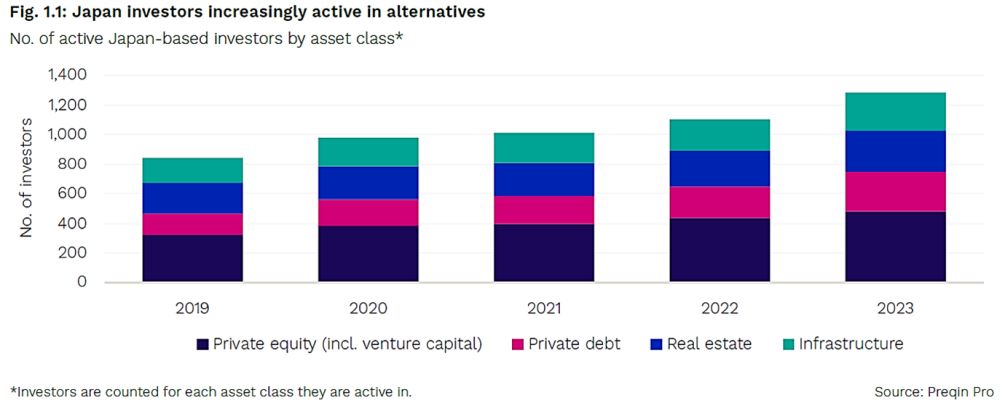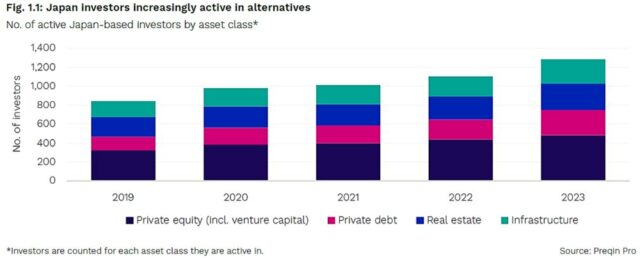This article forms part of a series of articles examining the
opportunities Japan presents for investment managers. It focusses
on the opportunities presented by Japanese institutional and retail
investors.
Japanese investors are progressively increasing their exposure
to private equity, private credit, infrastructure, real estate and
other alternative asset classes (collectively “Alternative
Investments”).

The move towards Alternative Investments is influenced by a
combination of factors, including the reemergence of inflation to
Japan, the pursuit of higher yields and the implications of a
declining population.
Current Landscape and Challenges
As of June 2023, Japan-based private capital funds manage assets
totaling US$115 billion, according to Preqin data1. This
figure includes foreign investments but represents only about 4% of
Japan’s pension fund assets2. This proportion is
insufficient to satisfy the investment needs of all Japan-based
investors, prompting them to allocate funds to international
managers in the US, EU, and beyond.
Retail Investors and Government Initiatives
Japanese households possess approximately US$14 trillion in
assets as of June 2023, with half of this amount held in cash and
deposits3. In stark contrast, US households keep a mere
13% in similar liquid forms.4
The Japanese government aims to double household investment
income and is actively promoting investment through the expansion
of the Nippon Individual Savings Account (“NISA”), a
tax-exempt investment scheme for individuals. The Japan Securities
Dealers Association reported a surge in new NISA accounts, with
over half a million opened in February 20245.
The recent authorisation for investment trusts to include
unlisted shares in NISA portfolios is anticipated to enhance retail
access to alternative assets. The Maples Group’s Asia practice
has recently advised on the public offerings of several Cayman
Islands unit trusts in Japan that invest in Blackstone’s
flagship funds, such as Blackstone Real Estate Income Trust
(“BREIT”), Blackstone Private Credit Fund
(“BCRED”), and Blackstone Private Equity Fund Strategies
(“BXPE”). This substantial savings reserve offers a
considerable new prospect for both domestic and international asset
managers.
Institutional Investors and Market Dynamics
The growing interest in Alternative Investments among Japanese
institutional investors has been providing substantial
opportunities for managers for some time. The diversity of Japanese
institutional investors and asset classes has expanded in recent
years, drawing increased attention from international managers.
Prominent US firms, including Blackstone, Brookfield, Apollo, and
KKR, have already established a presence in Japan.
Japan’s rapidly aging population is likely to further
drive institutional investors, such as pension funds and life
insurers, toward Alternative Investments. Currently, 29.1% of
Japan’s population is aged 65 or older, a figure projected to
exceed 34.8% by 20406.
Types of Investment Vehicles Used by Japanese
investors
Japanese investors utilise a diverse array of investment
vehicles across various jurisdictions, with the Cayman Islands
commanding a market share of over two-thirds (67.3%) of Japanese
investments in overseas investment funds7. The unit
trust and the exempted limited partnership (“ELP”) are
the investment structures of choice for Japanese investors in the
Cayman Islands. The different structures offer distinct advantages
that suit different needs. The ELP is established as a contractual
arrangement between the general partner who conducts the business
of the ELP and passive investor limited partners and is
particularly well-suited for situations where contractual
flexibility and tax transparency are paramount. The development of
the law in this area has been informed by the demands of the
private equity market and are generally flexible enough to
accommodate variation in a range of terms as negotiated between the
general partner and the limited partners. Further, the general
partner is often a special purpose vehicle established by the asset
manager thereby permitting the asset manager to manage the ELP
without the need to involve a third-party operator. The surge in
interest in Alternative Investments has led to the development of a
novel unit trust investment vehicle which has become very popular
in the market with certain institutional investors, the Private
Equity Type Unit Trust, the details of which are provided below.
Often, a Private Equity Type Unit Trust will channel investments
into an international manager’s limited partnership investment
fund, creating a layered investment strategy that leverages the
strengths of both vehicles.
Japan is also a significant user of Luxembourg and Ireland for
publicly offered funds, especially UCITS. This trend is expected to
grow as the population ages. Japanese institutional investors,
diversifying into Alternative Investments in Europe, are
increasingly favoring fund structures in Luxembourg, Ireland, and
Jersey. Many large Japanese institutional investors have
established fund vehicles in these jurisdictions, a trend that is
expected to continue.
The Rise of the Private Equity Type Unit
Trust
The burgeoning interest in Alternative Investments by
institutional investors has led to the swift adoption of the
‘private equity type’ unit trust (the “PE Type Unit
Trust”). This Cayman Islands unit trust, favoured by many
Japanese institutional investors, embodies certain private equity
fund features, such as capital call provisions and defaulting
investor clauses. The PE Type Unit Trust structure offers several
benefits for investors seeking exposure to Alternative Investments,
including but not limited to:
- Investor Familiarity: The Cayman Islands unit trust is a
well-established and popular vehicle among Japanese investors for
accessing complex investment strategies; - Tax Advantages: Investors can often achieve securities
investment trust tax status in Japan with this structure; - Off-Balance Sheet Accounting: For accounting purposes, the PE
Type Unit Trust is considered an off-balance sheet entity,
eliminating the need for account consolidation; and - JPY Hedging: Many Japanese investors prefer to hedge against
non-JPY currency exposure from non-JPY denominated Alternative
Investments. The PE Type Unit Trust structure facilitates this by
allowing for the distribution of both realised and unrealised gains
and providing a current net asset value for hedging purposes. This
contrasts with the limited partnership structure, where gains or
losses are not recognised until the investment is realised,
potentially delaying hedging activities.
Conclusion
The Maples Group’s Japanese Funds practice advises and
provides funds services to the industry’s heavyweights, as well
as new entrants to the market, on the structuring and establishment
of Cayman Islands, Luxembourg, Irish and Jersey funds targeted at
Japanese investors. For those considering establishing such funds,
please contact your usual Maples Group contact or one of the
contacts listed in this update.
This article is not intended to constitute, nor should it be
relied upon, as individual legal or tax advice. The choice of
structure will often be determined by many factors, including the
investor’s circumstances.
Footnotes
1. Fundraising from Japan 2024: A guide to raising
capital
2. https://www.boj.or.jp/en/statistics/sj/index.htm
3. https://asia.nikkei.com/Economy/Japan-households-financial-assets-hit-record-14tn-on-stock-rally
4. Financial Times article dated 14 December 2023
“Can Japan’s Legendary Savers Spark a Stock Market
Boom”.
5. Financial Times article dated 8 April 2024, “Is
Japan finally becoming a ‘normal’
economy?”
6. National Institute of Population and Social Security
Research
7. Japan Ministry of Finance, Regional portfolio
investment positions, end of 2022
The content of this article is intended to provide a general
guide to the subject matter. Specialist advice should be sought
about your specific circumstances.




